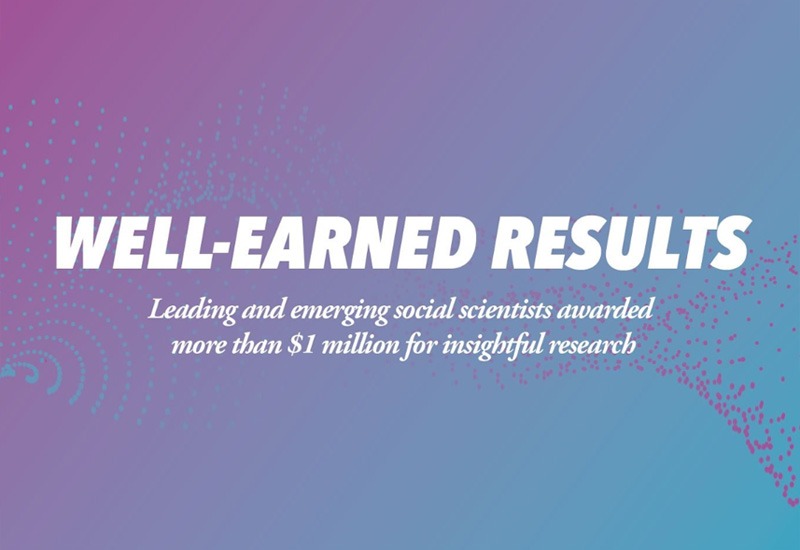Well-earned results

Archaeological legacies in Northern Newfoundland. Educational policy-making. Representation in Ottawa.
These diverse projects are just the tip of the iceberg of those receiving more than $1 million in new federal funding.
The Social Sciences and Humanities Research Council of Canada (SSHRC) is investing in multidisciplinary projects led by established and early-career researchers at Memorial whose work is leading to a better understanding of the world around us.
Researchers based in the faculties of Humanities and Social Sciences; Education; Business Administration; and the School of Science and the Environment at Grenfell Campus share a total of $1,327,333 in funding. The awards, posted on July 7, come from SSHRC’s Insight Grants competition.
Increasing capacity
“This significant investment by one of Memorial’s longtime federal partners gives our researchers the freedom and opportunity to explore important societal issues and train a new generation of scholars,” said Dr. Neil Bose, vice-president (research).
“Memorial is recognized internationally for leading-edge humanities and social sciences research. This latest funding will increase our university’s capacity in key areas. We are very grateful to SSHRC for its continued support and I wish our new awardees much success.”
Cultural change
Dr. Ágnes Juhász-Ormsby, associate professor, Department of English, Faculty of Humanities and Social Sciences, received $66,190 for her project, The Grammarians’ War and the Literary Culture of Early Modern English Schoolmasters.
According to Dr. Juhász-Ormsby, the Grammarians’ War was an influential pedagogical debate enacted by a group of schoolmasters between 1519-21.
She’s exploring how these educators, as agents of cultural change, extended their influence outside schools through social and political connections and literary publications intended for the wider public.
“My project will increase our knowledge of English and Neo-Latin literary and early modern intellectual history, and will contribute to the history of education with a special focus on the enduring cultural impact of educators in a transformative time period,” Dr. Juhász-Ormsby explained.
“Through an open-access interactive website, I intend to engage the broader public, particularly educators at the secondary level and policy-makers who are interested in the history of education, raising awareness of the long-lasting influence of educators’ creative contributions to cultural production, as well as the heritage value of book collections associated with schools.”
She says SSHRC’s funding allows her to hire graduate students, conduct research in archival collections and rare book libraries, and collaborate with colleagues in Canada and internationally.
‘Opportunities and chances’
At Grenfell Campus, Dr. Andreas Klinke, professor, School of Science and the Environment and director of the Environmental Policy Institute, received $181,974 for his project, Methodological Cosmopolitanism: Exploring Cosmopolitan Governance of Global Oceans.
“Oceans are vitally important for human existence and civilization because they provide food and raw materials, produce oxygen, absorb greenhouse gases and serve as important transportation routes for worldwide trade,” he told the Gazette.
“Paradoxically, oceans provide opportunities and chances, but they are also at risk and in danger and they pose risks and threats for human beings.”
Dr. Klinke says oceans raise a series of questions and issues about the balance between things such as conservation and use, ownership of ocean resources and jurisdiction.
Thanks to the SSHRC funding, he aims to “learn from trans-national institutions in the realms of fishery, marine biodiversity and sea transportation by analyzing their common and differing cosmopolitan characteristics, patterns of behaviour and action, globally oriented subject matters, and widely distributed expectations.”
He says the national funding is valuable as it will help “advance theory development in terms of cosmopolitan governance by transcending the nationalism, intergovernmental thinking and unilateral interests.”
He adds the investment also funds two PhD positions in Grenfell’s new Transdisciplinary Sustainability program.
Award recipients
Below are Memorial award recipients of SSHRC’s Insight Grants: October 2019 Competition. Several other Memorial researchers are collaborators and co-applicants on other projects.
Faculty of Business Administration
- Jeffrey Parsons, Project: Gig Data: Understanding data repurposing and designing for repurposability, $174,150.
Faculty of Humanities and Social Sciences
- Véronique Forbes, Department of Archaeology. Project: Biocultural and archaeological legacies at L’Anse aux Meadows, $302,165
- Ágnes Juhász-Ormsby, Department of English. Project: The Grammarians’ War and the Literary Culture of Early Modern English Schoolmasters, $66,190
- Fiona Polack, Department of English. Project: Oil Rigs and Islands, $71,949
- Yolande Pottie-Sherman, Department of Geography. Project: New home North: Housing experiences of newcomers in Canadian Northern cities, $192,964
- Kelly Blidook, Department of Political Science. Project: Representation in Ottawa, $246,320
Total: $879,588
Faculty of Education
- Darron Kelly, Project: Developing a Practical Discourse Survey Instrument for Assessing Dialogic Agency and Rational Trust in Educational Policymaking, $91,621
Grenfell Campus
- Andreas Klinke, School of Science and the Environment. Project: Methodological cosmopolitanism: exploring cosmopolitan governance of global oceans, $181,974.
Insight Grant competition total: $1,327,333